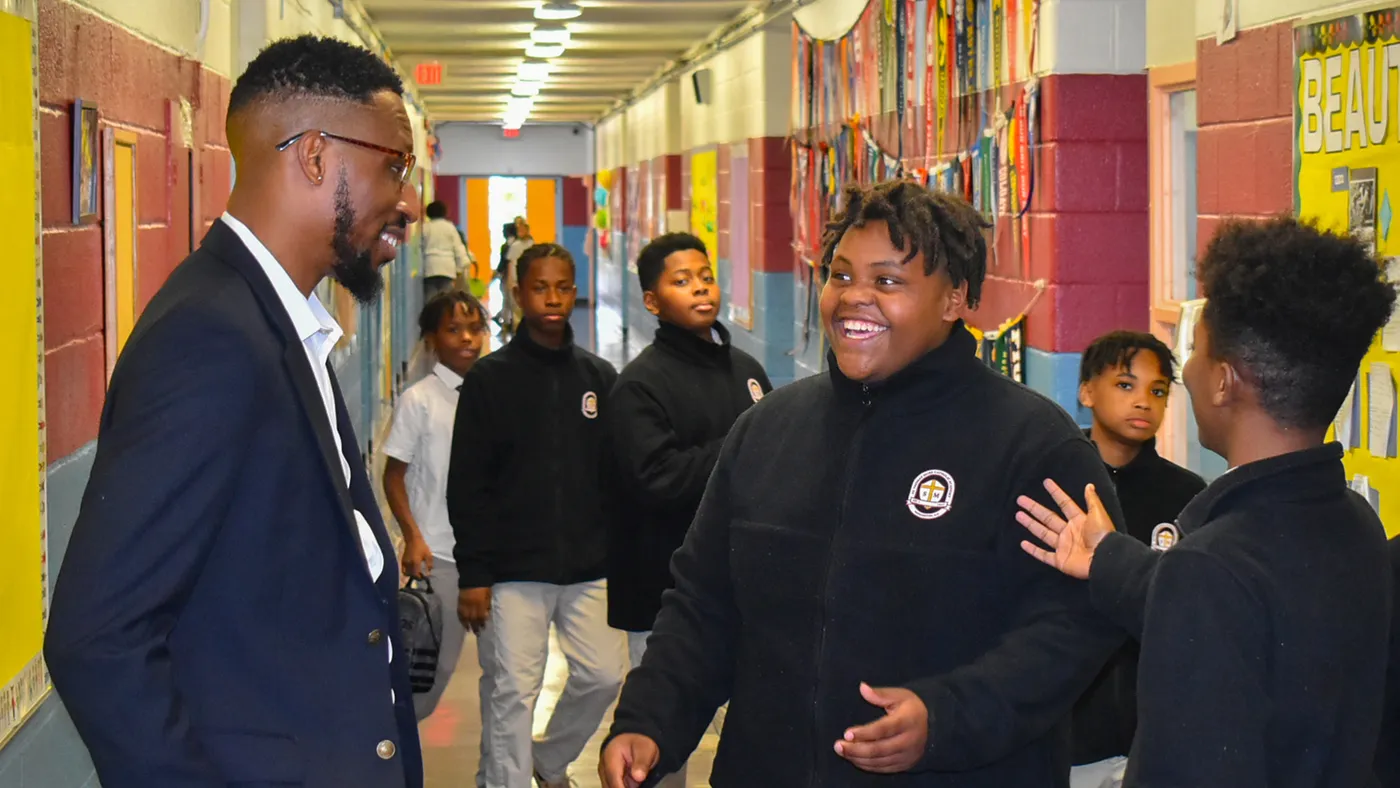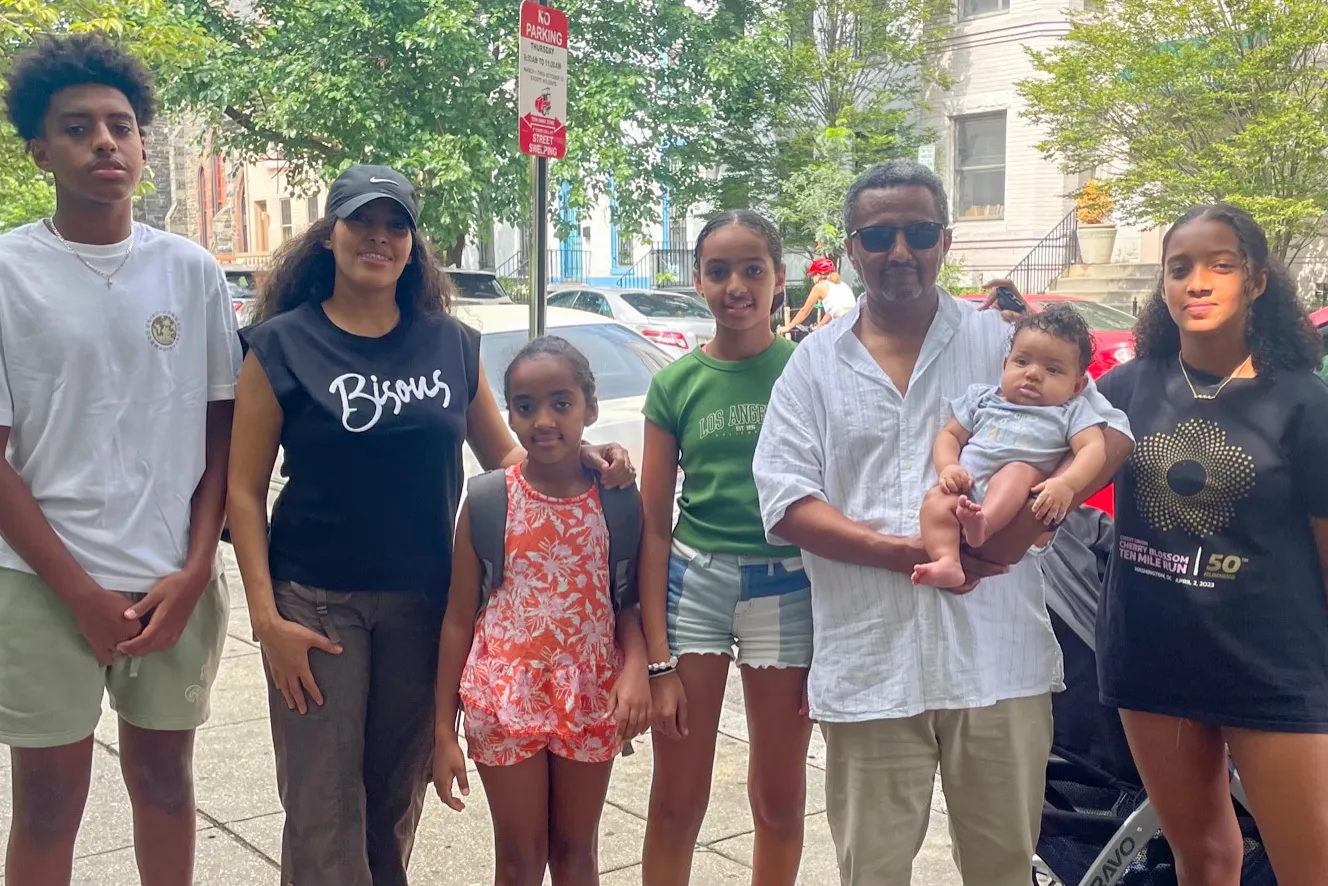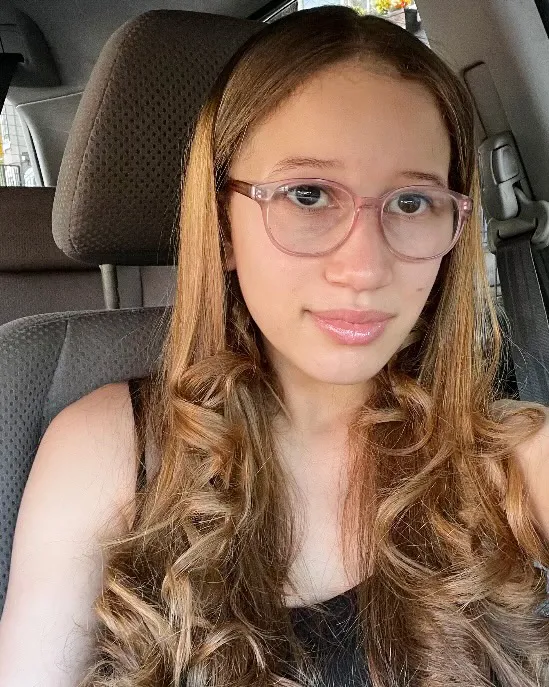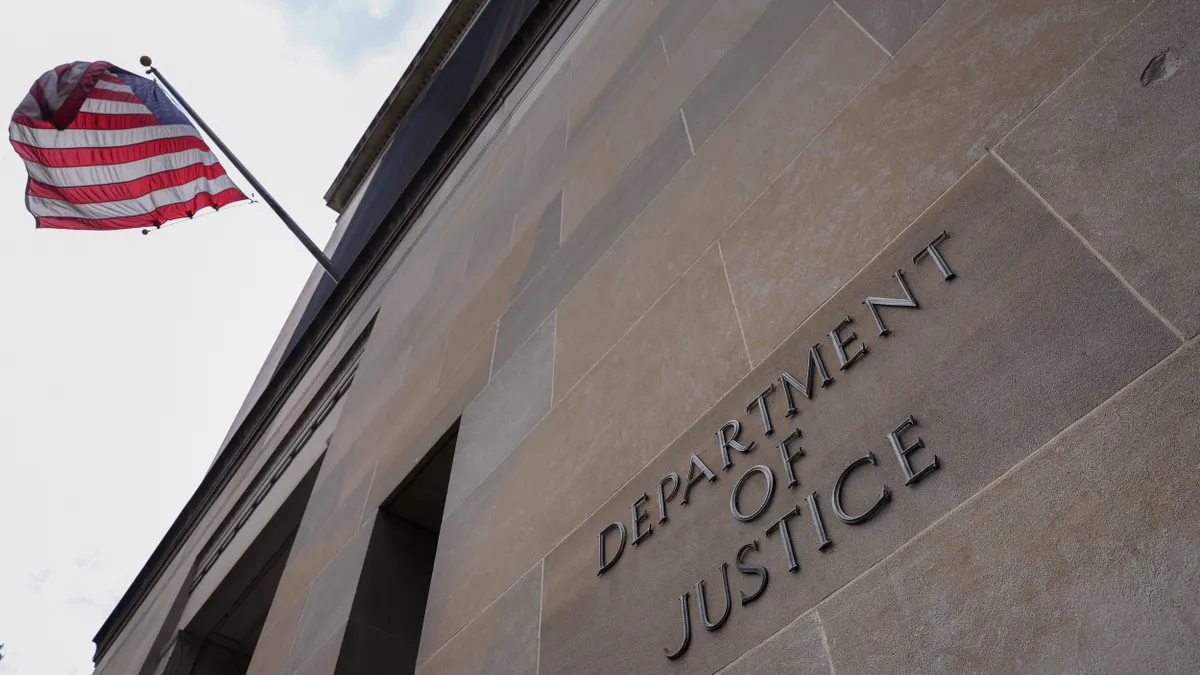This is part two of a two-part series. To view part one click here.
St. Thomas More Catholic Academy in Washington, D.C., is known as the "heart of Fourth Street" for its priority on creating a safe, welcoming and close-knit community.
Families living right across the street think they can't afford the $8,600 annual tuition for their children to attend the private, pre-K-8 school — but there's a good chance they can, said Principal Gerald Smith Jr. That's because they can get funding from the D.C. Opportunity Scholarship Program — the city's private school voucher program and the only one in the country supported by federal funds.
The school, located in an area with the city's highest percentage of families living under the poverty level, has been a longtime participant in the two-decade-old voucher program. An overwhelming 90% of Thomas More's 168 students participate in the scholarship program, which caps tuition assistance at $10,713 for elementary and middle school grades.
"It's very beautiful when a family comes in and knows that they have this opportunity," said Smith. Formerly a science teacher at the school, he now teaches 8th grade English in addition to being in his sixth year as principal.
The school employs 25 staff members, including a full-time counselor and two special educators. It also partners with nearby universities for instruction and health services. For example, students from Georgetown University School of Medicine give lessons in anatomy and physiology, as well as preventative health services.
"We've done a lot of amazing things not without struggle, but we're cultivating real change," said Smith. The scholarships support "those students that are at the edges of the circle, who are often overlooked, who may be troubled or living in troubled situations, to be given an opportunity to come into a space where we can cultivate character virtues, values, and love in them."
We've done a lot of amazing things not without struggle, but we're cultivating real change.

Gerald Smith Jr.
Principal of St. Thomas More Catholic Academy
Of the 40 private schools participating in the D.C. Opportunity Scholarship Program, 18 are Catholic schools within the Roman Catholic Archdiocese of Washington. All of the city's Catholic schools have participated in the program and accepted scholarship students since the program launched in 2004, said Brian Radziwill, director for government and grant programs with the archdiocese, in an email.
Radziwill said while he cannot provide the number of participating students in the archdiocese, more than half of the students getting the D.C. scholarships attend a Catholic school. The archdiocese allocates $6.2 million a year in tuition assistance across its five counties in Maryland and the District of Columbia on top of the D.C. voucher program and the BOOST (Broadening Options and Opportunities for Students Today) program in Maryland, a state-run, state-funded private school scholarship program.
Still, the funding remains insufficient to meet the estimated $25 million in total financial need across the D.C. Archdiocese, Radziwill said.
Smith said his school has been unable to enroll interested students when a family just barely exceeded the income cap to qualify, or because a family lacked the resources or ability to submit the annual application.
"There's a huge need. There's a huge demand for the funding. It's not always there," he said.
According to Serving Our Children, the nonprofit organization that administers the D.C. scholarship program, about 46,000 applications have been received since 2004 and about 11,800 students have been awarded scholarships.
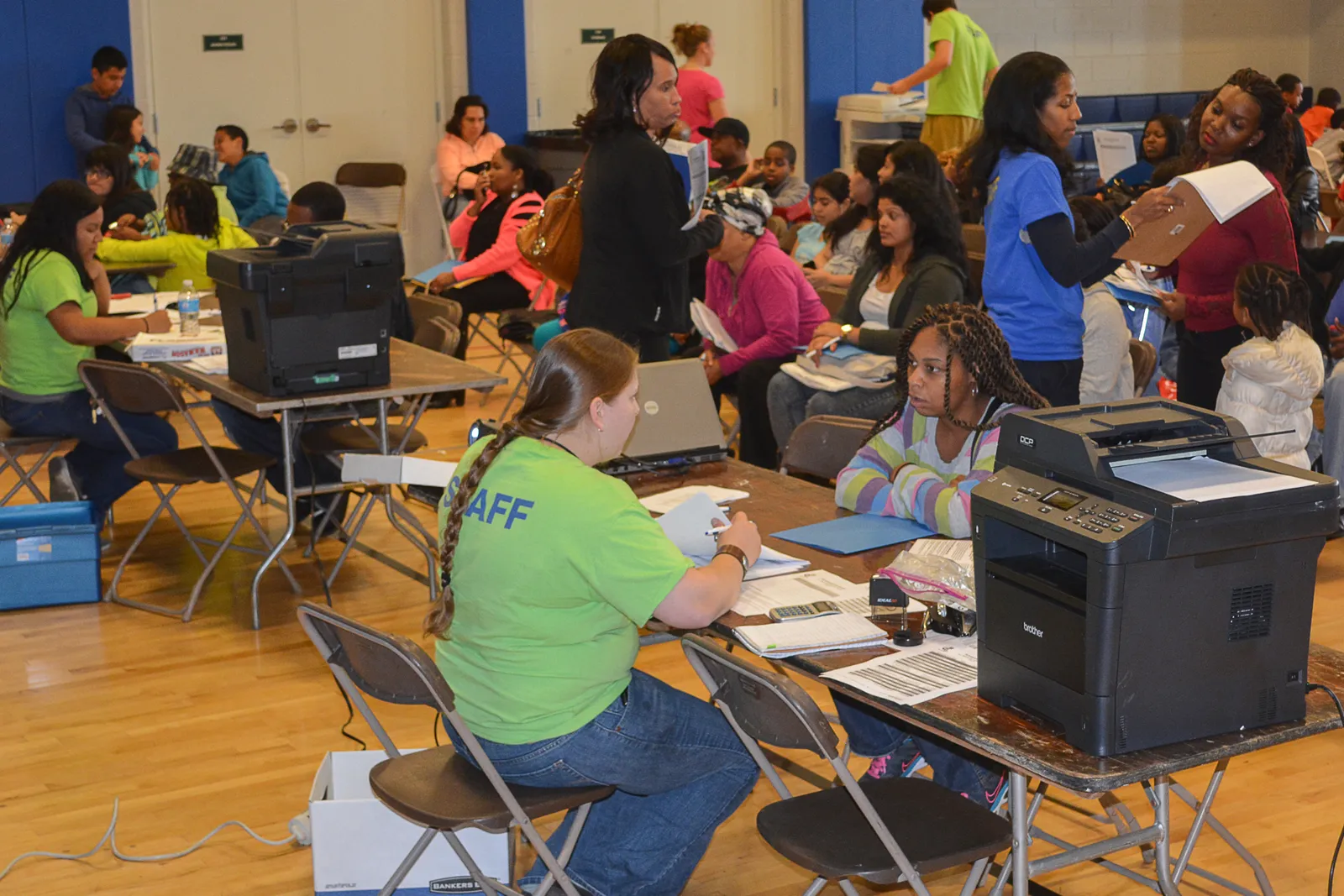
How students are performing
A question asked repeatedly over the program's two-decade life span is whether it improves student outcomes. Despite being likely the most studied school voucher program in the country, the answer is: It depends on what metric you're looking at.
A comprehensive analysis published in 2019 by the U.S. Department of Education's Institute of Education Sciences looked at various outcomes, including reading and math achievement, chronic absenteeism, and parent and student satisfaction.
IES had published five previous reports as required by Congress, and the 2019 study examined the three-year outcomes of applicants from 2012, 2013 and 2014 — including both students offered scholarships and those who weren't. Nearly a quarter of the students offered scholarships did not wind up using them.
The 2019 study used the "gold standard" of evaluation methodology by comparing the outcomes for the two groups of students. That meant students in both groups had to take the same assessments for comparison. The same type of data on student attendance and parent satisfaction had to be collected for both groups.
The impact of accepting a voucher on academic achievement in these programs is on par with or worse than the learning loss caused by Hurricane Katrina and the COVID-19 pandemic.

The National Coalition for Public Education
In an April 18 letter to members of Congress
For academic outcomes, researchers found no statistically significant differences in reading or math three years after students had applied to the program. In fact, students who received scholarships — regardless of whether they used them — scored 1.6 percentile points lower in reading than students who did not get scholarships. Scholarship recipients scored 0.1 percentile points higher in math.
Researchers then parsed out the performance of students who actually used the scholarships and found they tested 2.1 percentile points lower in reading and 0.2 percentile points higher in math compared to the control group.
Voucher opponents point to this data as proof that taxpayer-funded private school tuition programs aren't helping students.
The National Coalition for Public Education, in an April 18 letter to the chair and ranking member of the House Subcommittee on Early Childhood, Elementary and Secondary Education, said studies from Louisiana, Indiana, Ohio and Washington, D.C., all show poor performance of voucher recipients.
"The impact of accepting a voucher on academic achievement in these programs is on par with or worse than the learning loss caused by Hurricane Katrina and the COVID-19 pandemic," the letter states.
The 2019 IES study didn't examine the D.C. scholarship program's influence on the overall academic performance of students in traditional public schools or charter schools. But some local officials over the years have credited the program's funding of public schools for sparking improvements in teacher retention, student enrollment, public charter expansion and student academic achievement.
Indeed, 4th grade reading scores on the 2022 National Assessment of Educational Progress showed that 49% of D.C.'s public school students scored at or above a basic level in reading. That was up from 28% in 1998.
D.C.'s 4th grade reading NAEP scores improve over two decades
However, a closer look at the NAEP data for 2022 shows Black students in D.C. public schools averaged 69 points lower than White students. That performance was not significantly different from 1998. Students who were eligible for free and reduced-price school meals scored an average 56 points below other students. This gap has actually widened from 42 points in 1998.
Voucher supporters contend that private school choice programs help area public schools by driving improvements through competition. The 2019 IES report found that chronic absenteeism for students offered a scholarship was 5.4 percentage points lower than for the group not offered a scholarship. The research also showed positive school satisfaction for students who had applied to the D.C. scholarship program three years earlier, but no statistically significant impact on parent satisfaction for those with participating students.
"It's a clear signal that the competitive effects of choice improve academic outcomes, both for the participants of the choice program and for the kids who are in the public school as well," said Lindsey Burke, director of the Center for Education Policy at the Heritage Foundation.
IES hasn't issued a study on the D.C. program since 2019. The agency has been collecting new data and plans a 2024 release.
Beginning in 2019, Congress capped funding for evaluations at $500,000 annually. Before then, allocations had averaged about $1.5 million annually. The COVID-19 pandemic, as well as a change in how scholarship recipients are chosen, also interfered with IES's evaluation processes.
Nationally, there are countless research papers on school voucher programs — and even investigations into published papers — that point both to the system's flaws and its benefits.
If these programs [private school vouchers] are built on the idea that these are lifelines out of failing D.C. public schools, then that needs to be checked, and it needs to be checked in a way that's transparent.

Joshua Cowen
Professor of education policy at Michigan State University
Joshua Cowen, a professor of education policy at Michigan State University, has researched voucher programs across the country, including D.C.'s Opportunity Scholarship Program. His recent research points out lower achievement rates for voucher participants nationally, as well as the need for more accountability for participating schools.
"I think we should take seriously when parents say they're satisfied with their kids' school, either public or private, but if these programs [private school vouchers] are built on the idea that these are lifelines out of failing D.C. public schools, then that needs to be checked, and it needs to be checked in a way that's transparent," Cowen said.
"Maybe they're great now, but we need to know, especially if we're promising these kids and their parents massive improvements in their educational opportunity," he said.
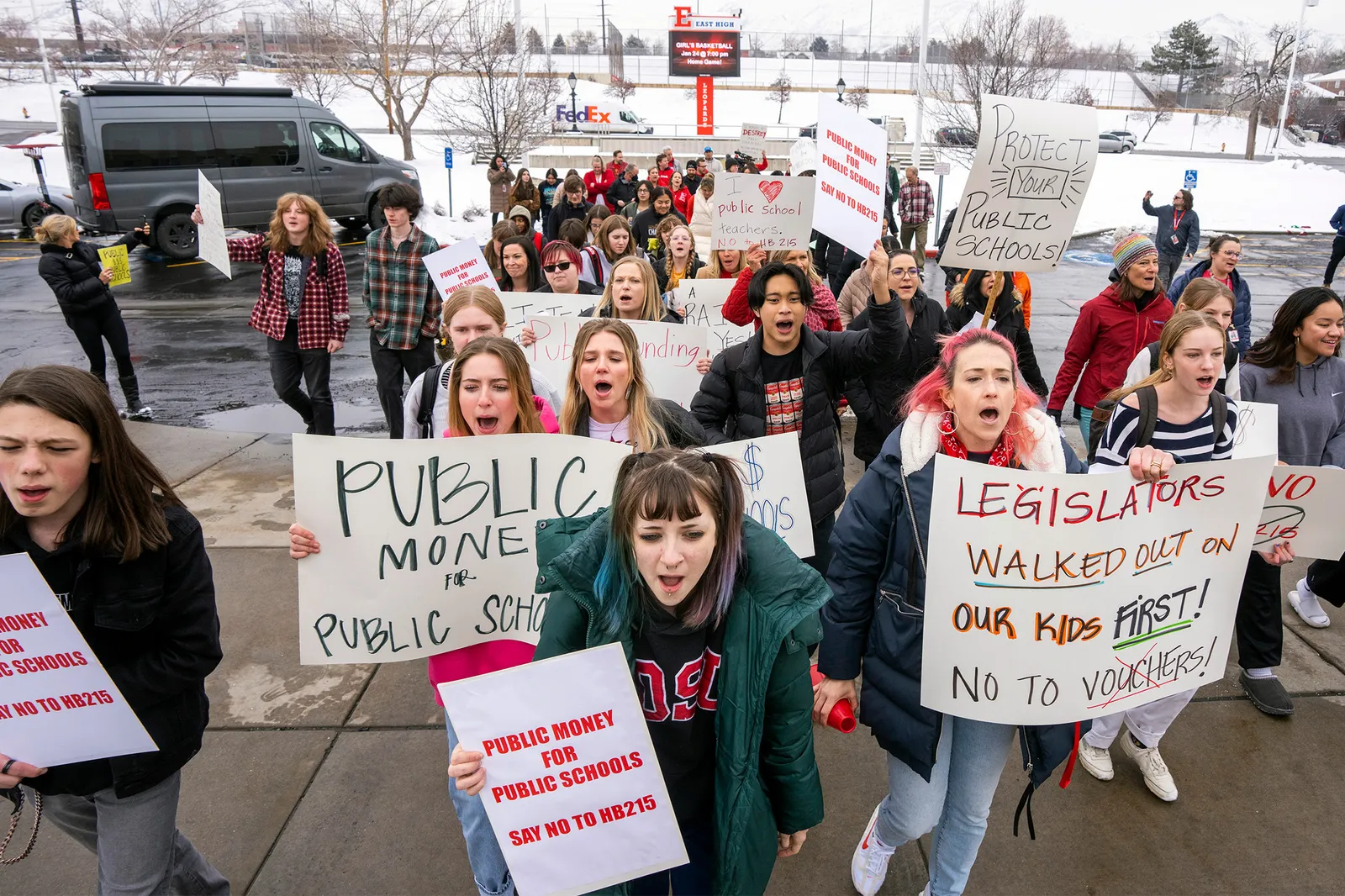
The fight over funding
While pro-voucher advocates say they feel under attack from those who don't want public funds used for private school tuition, they also have supporters on Capitol Hill who want to expand the D.C. program.
The funding structure of the D.C. program is currently in limbo as Congress debates the FY 2024 budget. A proposal from the House Appropriations Committee recommends increasing funding for the D.C. program by $8.75 million for FY 2024, or one half of the overall annual allocation while shrinking the amount the traditional public school system would get to one-sixth. The charter school allocation would remain at one-third.
A Senate appropriations plan does not change the structure or funding amounts for the D.C. voucher program and the difference of opinions on funding between the House and Senate would need to be negotiated.
In a Sept. 13 letter to House and Senate Appropriations Committee leaders, D.C. Council members called the House proposal "deeply misguided" and said it would hurt the city’s constituents.
Meanwhile, on the authorizing side, lawmakers in both the House and Senate have recommended permanently authorizing the D.C. voucher program and increasing the total FY 2024 allocation to $75 million, up from $52.5 million.
A handful of other pending bills recommend using federal education dollars to support school choice through education savings accounts, which give parents access to public funds for private school tuition, tutoring, online learning programs and other educational uses.
Suzanne Wells, a D.C. resident and substitute teacher in a D.C. Public Schools early learning program, said using public funds to support a small private school student population is unfair to the public school system. The money would be better spent improving the traditional public schools, said Wells, who is also part of the Ward 6 Public Schools Parent Organization.
But to Wells and other D.C. parents opposed to the voucher program, the fight to protect the city's public schools isn't so much against the D.C. Opportunity Scholarship Program as it is directed toward the public charter school system. With charter school enrollment almost equaling traditional public school enrollment in the District, that's where the real threat lies, they said.
According to the D.C. Public Charter School Board, the city's 135 public charter schools served 45,251 students in 2021-22. The per-pupil cost for all D.C. public school students in FY 2021 was $24,535 — the second-highest in the country behind New York City, according to the U.S. Census Bureau.
The tug of war over taxpayer dollars for education is likely to escalate in D.C. and other localities that have private school vouchers or school choice programs like education savings accounts.
A Nov. 1 revised analysis by Edunomics Lab, a Georgetown University research center that studies education funding, found state education funding for private school options stands at $8.6 billion nationally, which is just 2% of total state-level education spending of $402 billion.
The analysis also showed that although that share is relatively small, it's growing — and is substantial in some states, such as Arizona, Florida and Wisconsin.
According to EdChoice, an organization supporting private school choice, 32 states funneled an estimated $4 billion in subsidies to some 690,000 students in the 2022-23 school year through tuition vouchers, education savings accounts, and tax-credit scholarships.
These programs have the potential to undermine traditional public school systems and lead them into “financial death spirals," says one lawsuit filed in the Wisconsin Supreme Court last month by residents opposing publicly funded school choice programs.
But in D.C. and elsewhere, private school choice supporters say competition for students will lead to higher-quality education for all students — regardless of whether they're using vouchers or attending traditional public schools or charters.
And tensions will always exist over government-controlled programs, said Burke, from The Heritage Foundation.
“Until you break that monopoly a little bit and actually allow families of all stripes, whatever your political view is, to find a school that aligns with your values and hopes and dreams and aspirations for your child, we're always going to have these contentious debates," Burke said.

